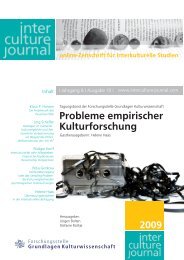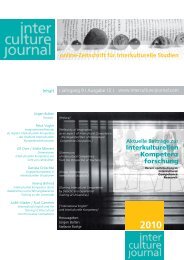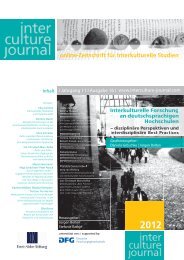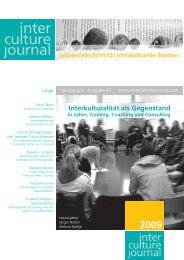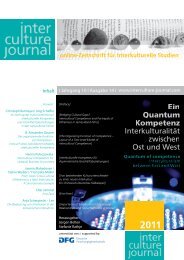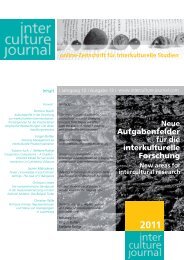Aktuelle Anwendungsfälle Interkultureller Kommunikation | Current ...
Aktuelle Anwendungsfälle Interkultureller Kommunikation | Current ...
Aktuelle Anwendungsfälle Interkultureller Kommunikation | Current ...
Erfolgreiche ePaper selbst erstellen
Machen Sie aus Ihren PDF Publikationen ein blätterbares Flipbook mit unserer einzigartigen Google optimierten e-Paper Software.
Intercultural<br />
Please insert<br />
competence<br />
the the title title of of<br />
development in higher<br />
your article here<br />
education study abroad<br />
programs: A good practice<br />
example<br />
[Entwicklung<br />
First First name Surname interkultureller<br />
Kompetenz in universi-<br />
Please Please insert insert information information about about<br />
tären<br />
the the author author Auslandsstudienpro-<br />
here here (e.g. (e.g. title, title, posiposigrammen:tion,tion, institution) institution) Ein Good-<br />
Practice-Beispiel]<br />
Alexandra Dehmel<br />
Dr., works at the European Centre<br />
for the Development of Vocational<br />
Training (Cedefop); previously<br />
research assistant at the<br />
Department of Business and Human<br />
Resource Education, University<br />
of Paderborn. Research interests:<br />
vocational education and<br />
training, comparative research,<br />
development of intercultural<br />
competence, adult learning. The<br />
views in this article do not reflect<br />
those of Cedefop.<br />
Yi Li<br />
M.A., research assistant and doctoral<br />
student at the Department<br />
of Business and Human Resource<br />
Education, University of Paderborn.<br />
Research interests: intercultural<br />
education and training, development<br />
of intercultural competence,<br />
internationalization of<br />
higher education.<br />
Peter F. E. Sloane<br />
Prof. Dr., professor at the Department<br />
of Business and Human<br />
Resource Education, University of<br />
Paderborn. Research interests:<br />
self-regulated and collaborative<br />
learning, design-based research,<br />
didactic issues in the vocational<br />
education and training sector,<br />
among others.<br />
Dehmel / Li / Sloane: Intercultural competence development in higher education study abroad<br />
programs: A good practice example<br />
Abstract [English]<br />
International student mobility programs at higher education<br />
level have increasingly been fostered over the past years.<br />
Most of these programs merely send students for a term<br />
abroad, but do not provide comprehensive accompanying<br />
measures before, during and after the stay. There is no doubt<br />
that through a short time of studying in another country, participants<br />
gain intercultural living and learning experience.<br />
However, some crucial questions remain: How effective and<br />
efficient are such programs in promoting intercultural learning<br />
and competence development? How can they be designed<br />
in order to foster the students’ learning processes and<br />
to increase learning outcomes? This article addresses these<br />
questions and provides an example of a comprehensive study<br />
abroad program for graduate students.<br />
The article gives an overview of current research on study<br />
abroad programs and defines the term intercultural competence.<br />
It then presents the „Asian Studies in Business and<br />
Economics (ASBE) program” at the University of Paderborn<br />
(Germany) as a good practice example. The strengths of the<br />
program are: It a) consists of four master-level modules, all<br />
fully integrated into the curriculum of the Master programs;<br />
b) provides continuous and systematic accompanying<br />
measures over a long period of time (preparation, study<br />
abroad and follow-up phases); c) uses an innovative, learnercentered<br />
pedagogical design that combines individual and cooperative<br />
learning and applies – amongst others – experiential<br />
and reflective learning as well as the critical incidents<br />
technique.<br />
Keywords: Intercultural competence, higher education, study<br />
abroad programs, pedagogical design, good practice example<br />
Abstract [Deutsch]<br />
Universitäre Auslandsstudienprogramme wurden in den vergangenen<br />
Jahren verstärkt gefördert. Die meisten dieser Programme<br />
senden ihre Teilnehmer / innen lediglich für eine<br />
gewisse Zeit ins Ausland, bieten aber keine umfassenden Begleitprogramme<br />
vor, während und nach dem Auslandsaufenthalt.<br />
Obwohl kein Zweifel daran besteht, dass Studierende<br />
durch einen solchen Auslandsstudienaufenthalt interkulturelle<br />
Lebens- und Lernerfahrungen sammeln, bleiben dennoch einige<br />
wichtige Fragen offen: Wie effizient und effektiv sind<br />
diese Programme darin, interkulturelles Lernen und die Entwicklung<br />
interkultureller Kompetenz zu fördern? Wie können<br />
sie gestaltet werden, um Lernprozesse optimal zu unterstützen<br />
und Lernergebnisse zu steigern? Der vorliegende Artikel<br />
11 © Interculture Journal 2011 | 15



